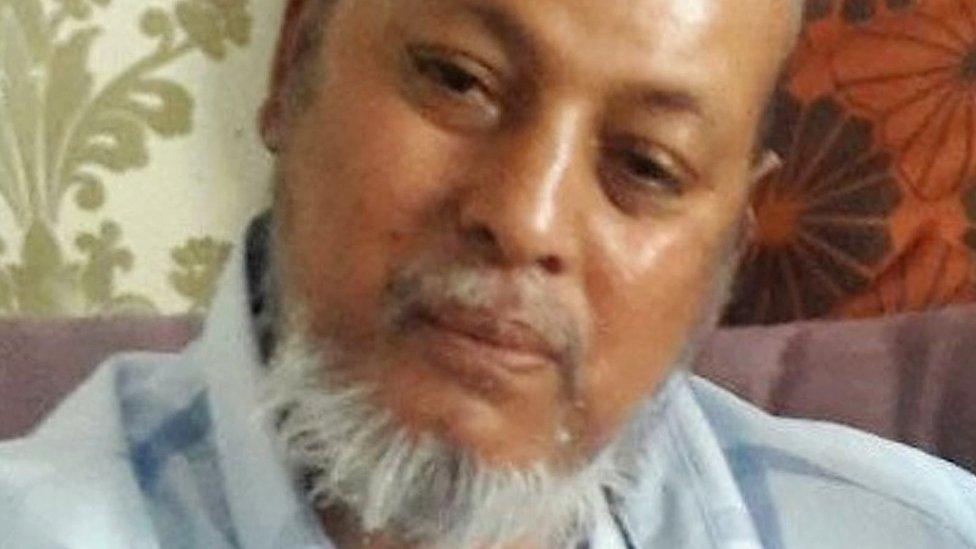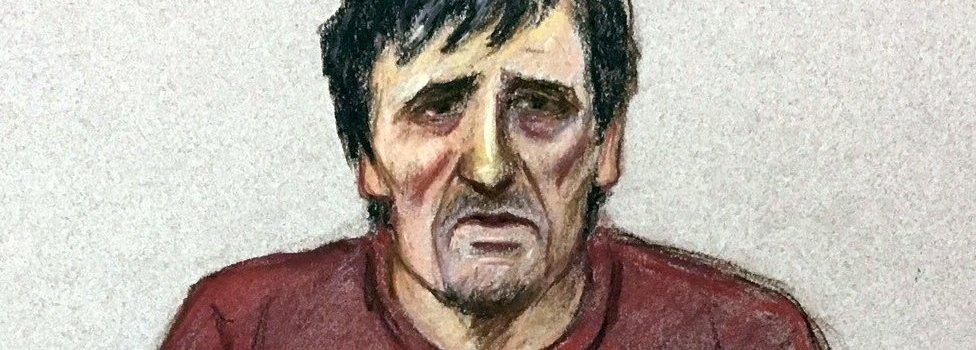Darren Osborne guilty of Finsbury Park mosque murder
- Published
CCTV showed Darren Osborne's movements before and during the attack
A man who drove a van into a crowd of Muslims near a London mosque has been found guilty of murder.
Darren Osborne, 48, ploughed into people in Finsbury Park in June last year, killing Makram Ali, 51, and injuring nine others.
Osborne, from Cardiff, was also found guilty of attempted murder and is due to be sentenced on Friday.
Prosecutors said they were "clear throughout that this was a terrorist attack".
The jury took an hour to return the verdict at Woolwich Crown Court after a nine day trial.
Sue Hemming, from the Crown Prosecution Service, said: "Darren Osborne planned and carried out this attack because of his hatred of Muslims. He must now face the consequences of his actions."

Darren Osborne was found guilty of murder and attempted murder, at Woolwich Crown Court
Cdr Dean Haydon from the Metropolitan Police said: "Osborne's evil and cowardly actions meant a family has tragically lost a husband, father and grandfather."
Some of those injured "could suffer from health issues for the rest of their lives", he added.
Jurors heard the area outside the Muslim Welfare House had been busy with worshippers attending Ramadan prayers on 19 June.
Mr Ali had collapsed at the roadside in the minutes before the attack.
Several of those who went to help him said he was alive and conscious in the moments before being struck by the van.

Makram Ali, 51, was killed in the attack
Osborne drove the van into the crowd at about 00:15. Jurors were told the van only stopped when it hit some bollards.
He then got out of the van and ran towards the crowd.
CCTV shows the moments before a van hit a crowd near Finsbury Park mosque
Police later found a letter in the van written by Osborne, referring to Muslim people as "rapists" and "feral".
He also wrote that Muslim men were "preying on our children".
The trial heard Osborne became "obsessed" with Muslims in the weeks leading up to the attack, having watched the BBC drama Three Girls, about the Rochdale grooming scandal.

Analysis
By Dominic Casciani, BBC home affairs correspondent

In just a few weeks, Darren Osborne went from a troubled, angry and unpredictably violent alcoholic to a killer driven by ideology.
The rapid radicalisation - the way he became fixated on the idea that Muslims in Britain were some kind of nation within a nation, is one of the most shocking parts of this awful crime.
The sources of that radicalisation, including his obsession with a television programme about the Rochdale abuse scandal, show how difficult it is to predict who will become a danger to society.
But the fact that he smiled contentedly after he had run over and killed Makram Ali proved to the jury that his motive was ideological.
Osborne is not the first terrorist to have radicalised so quickly. In 2014, a young man who was groomed by Islamists went through a similarly rapid change.
The speed at which these men and others went from a change of mindset to planning an attack is one of the issues that most concerns the security services.

Osborne told the court he had originally hired the van to kill Labour leader Jeremy Corbyn at a march he was due to attend.
He said it "would have been even better" if London Mayor Sadiq Khan had been present, adding: "It would have been like winning the lottery."
Responding to the verdict, Mr Corbyn - who is MP for the area where the attack took place - said it was "a hate-filled attack that... shocked us all".
"I was proud of how, in the wake of this terrible event, we all came together to reject hate and embrace hope, and that is the kind of country we live in," he added.
'Loner and alcoholic'
A statement from his partner Sarah Andrews, read out in court, said he seemed "brainwashed" and "totally obsessed".
Ms Andrews - who had been in a relationship with Mr Osborne for about 20 years and with whom she had four children - described him as a "loner and a functioning alcoholic" with an "unpredictable temperament".
Osborne started following Tommy Robinson, one of the founders of the English Defence League (EDL), and other far-right leaders on social media, in the fortnight before the attack.
Mr Robinson sent him a group email saying: "There is a nation within a nation forming beneath the surface of the UK. It is a nation built on hatred, on violence and on Islam."
Jurors were shown footage which allegedly shows Darren Osborne writing at a pub table two days before the attack
Cdr Haydon said the investigation had the "full weight" of the Met's Counter Terrorism Command behind it.
He warned that online material had played a "significant role" in how Osborne was radicalised and "brainwashed".
If Osborne's aim had been to "create divisions and hate between communities", then he had "failed", he said.
"The response [of those involved], and the overwhelmingly positive reaction my officers and teams have witnessed since, highlights how far from reality Osborne's sick and twisted views really are," he added.
'Scars will stay'
The Muslim Council of Britain (MCB) welcomed the verdict, but added: "We cannot be complacent and regard this as a one-off terrorist incident."
Harun Khan, secretary general of the MCB, said: "The scenes we witnessed last summer were the most violent manifestation of Islamophobia yet in our country.
"The case tells us that we must all exercise caution when tempted to stigmatise any group of people, regardless of colour, creed or community."
Khalid Oumar, a trustee of the mosque and founder of the Finsbury Park Attack victims' voice forum, praised the strength of the community, adding: "The scars will stay with them forever, but the community is determined to go about daily life without fear and to stand together against victimisation and violence."